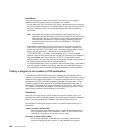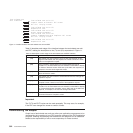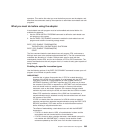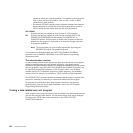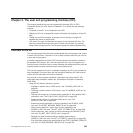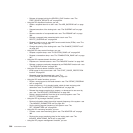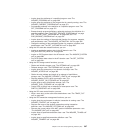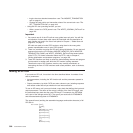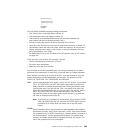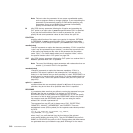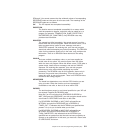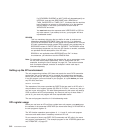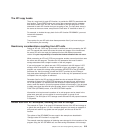– Release all storage held by the SEARCH_LDAP function—see “The
FREE_SEARCH_RESULTS call” on page 324.
v Using the XPI dispatcher functions, you can:
– Obtain a suspend token for a task—see “The ADD_SUSPEND call” on page
334
– Suspend execution of the issuing task—see “The SUSPEND call” on page
335
– Resume execution of a suspended task—see “The RESUME call” on page
339
– Release a suspend token associated with a task—see “The
DELETE_SUSPEND call” on page 340
– Request a wait on one or more MVS event control blocks (ECBs)—see “The
WAIT_MVS call” on page 340
– Change the priority of the issuing task—see “The CHANGE_PRIORITY call”
on page 344.
v Using the XPI dump control functions, you can:
– Request a system dump—see “The SYSTEM_DUMP call” on page 345
– Request a transaction dump—see “The TRANSACTION_DUMP call” on page
347.
v Using the XPI enqueue domain functions, you can:
– Enqueue on a named resource—see “The ENQUEUE function” on page 349
– Release a resource previously enqueued by an ENQUEUE function call—see
“The DEQUEUE function” on page 350.
v Using the XPI kernel domain functions, you can:
– Inhibit purge for the current task—see “The START_PURGE_PROTECTION
function” on page 351
– Reenable purge for the current task—see “The
STOP_PURGE_PROTECTION function” on page 351.
v Using the XPI loader functions, you can:
– Define a new program to the loader domain—see “The DEFINE_PROGRAM
call” on page 353
– Load a program or, if it is already loaded, obtain its load and entry-point
addresses—see “The ACQUIRE_PROGRAM call” on page 356
– Release the storage occupied by a program, or decrement its use count by
one—see “The RELEASE_PROGRAM call” on page 358
– Delete a program definition from the list of current programs—see “The
DELETE_PROGRAM call” on page 359.
v Using the XPI log manager functions, you can:
– Retrieve information about the activity keypoint frequency of the system—see
“The INQUIRE_PARAMETERS call” on page 360
– Set the activity keypoint frequency of the system—see “The
SET_PARAMETERS call” on page 361.
v Using the XPI monitoring functions, you can:
– Process a user event-monitoring point—see “The MONITOR call” on page
362
– Retrieve the current monitoring data for the issuing task—see “The
INQUIRE_MONITORING_DATA call” on page 364.
v Using the XPI program management functions, you can:
306 Customization Guide



